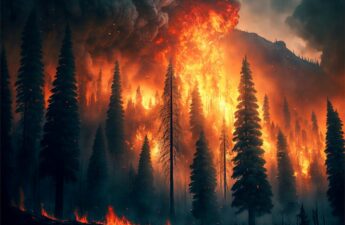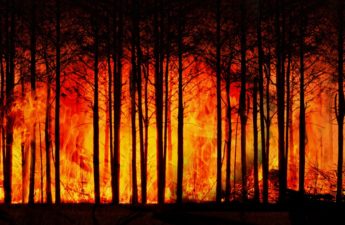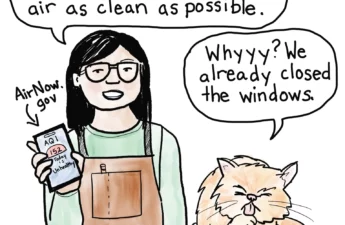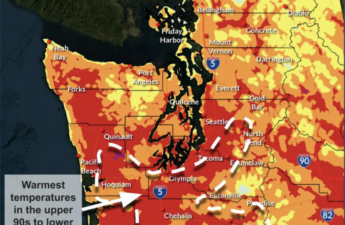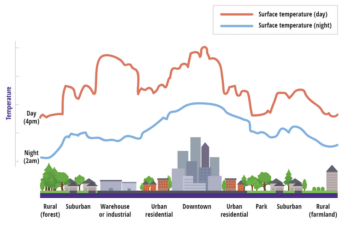Category: Environment
Stay safe in freezing temperatures with these winter weather tips
The National Weather Service has issued a cold weather advisory through Wednesday. Most of the state will experience dangerously low temperatures that can lead to hypothermia, frostbite, and other health issues. These risks are especially high for people working outdoors, those without shelter or adequate heating, the elderly, and pets.
Wildfire smoke exposure linked to increased dementia risk
New research led by the University of Washington in Seattle has found that long-term to wildfire smoke exposure was associated with a significant increase in the odds that a person would be diagnosed with dementia.
Microplastics are in our brains. How worried should I be?
Sarah Hellewell, Curtin University; Anastazja Gorecki, University of Notre Dame Australia, and Charlotte Sofield, University of Notre Dame Australia Plastic is in our clothes, cars, mobile phones, water bottles and food containers. But recent research adds to growing concerns about…
Expert: The Impact of Climate Change on Global Nutrition Is a National Security Issue
Weather events over the past several years have led to lower harvests, lost agricultural incomes and increasing food prices. All those factors contribute to increasing rates of malnutrition.
As wildfires become more frequent and intense, how will persistent smoke exposure affect long-term health?
Although Canada has seen notable improvements in air quality over the past 30 years, increasingly frequent and intense periods of wildfire smoke threaten to undo this progress. In the last two decades, while emissions from most pollution sources declined, Canadians’ exposure to wildfire smoke has increased by approximately 220 per cent.
Health News Headlines
Wildfire smoke expected in Seattle – ACL tears in women – 5 ways to manage hypertension
Four steps to stay safe from wildfire smoke this summer
Breathing wildfire smoke can harm everyone’s lungs, heart, and overall health. And this year we’re expecting hotter weather and less rain—meaning more smoky days.
Climate change and mental health: How extreme heat can affect mental illnesses
Many people can relate to the sleepless nights during hot summer months, as well as anecdotal experiences of irritation and aggression when thermally uncomfortable.
But for those living with mental illnesses, the hazard of extreme heat is more dire than temperamental responses to day-to-day disruptions.
CDC launches new online heat-risk resources
New Heat and Health Initiative, developed in response to increased health risks from heat exposure, aims to improve American’s ability to stay safe during heat events
The Cost of Freeing Drinking Water from ‘Forever Chemicals’
In proposing the limits, EPA officials said that they had leveraged the latest science to protect the public from PFAS pollution. Environmental groups welcomed the move as long overdue. But the standard has drawn widespread criticism from the water utility industry and some scientists who say that in many places, small drops in PFAS water levels will matter little for exposure or health.
Resources and emergency shelters available statewide to keep people safe and warm during dangerously cold winter weather
Cold weather can be very dangerous if you are not prepared, particularly for people without homes, the elderly, and those with medical conditions. Health risks include hypothermia, frostbite, falls, vehicle accidents, and carbon monoxide poisoning from improper indoor use of fires or generators. Winter storms can make these problems worse by causing power outages and property damage.
TIPS FOR CLEAN AIR INDOORS ON SMOKY DAYS: A PUBLIC HEALTH COMIC
Comic by Meredith Li-Vollmer from Public Health — Seattle & King County
Hottest temperatures of the year forecasted for Western Washington this week
National Weather Service issues excessive heat warning for much of Puget Sound
How to Prepare for an Early and Long 2023 Wildfire Season in King County
his year, wildfire smoke is forecast to start early in King County and last into the fall. Record-setting forest fires have already darkened skies in Canada and the eastern U.S., and our region is set to be next. By preparing now, you can help to protect your and your family’s lungs, heart, and health from smoke.
Saving lives from extreme heat: Lessons from the deadly 2021 Pacific Northwest heat wave
The 2021 heat dome was Washington’s deadliest weather disaster on record. It contributed to 441 deaths in the state between June 27 and July 3, our research shows. Medical systems were overwhelmed. There are numerous ways to avoid this deadly of an outcome in the future. Many emerge from thinking about extreme heat as long-term risk reduction, not just short-term emergency response.

